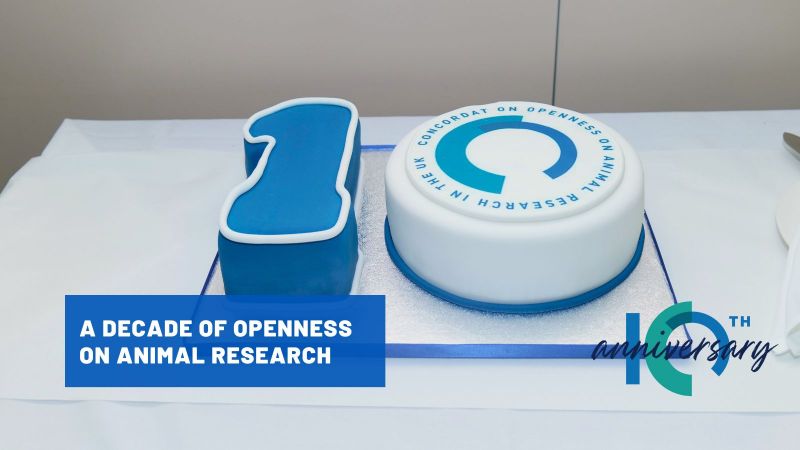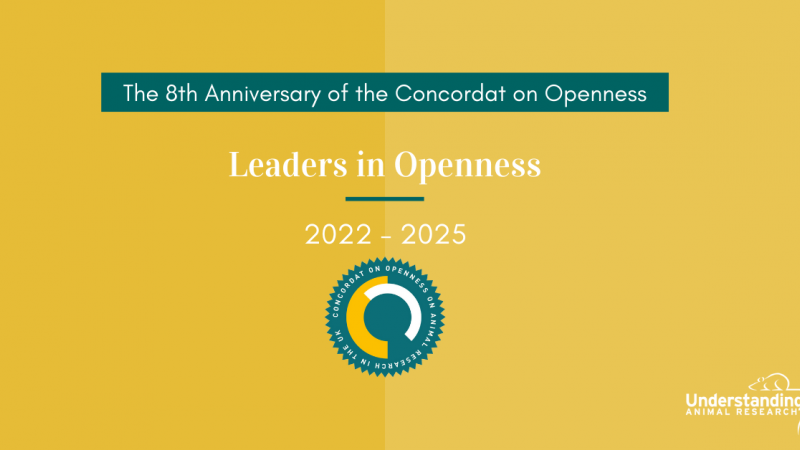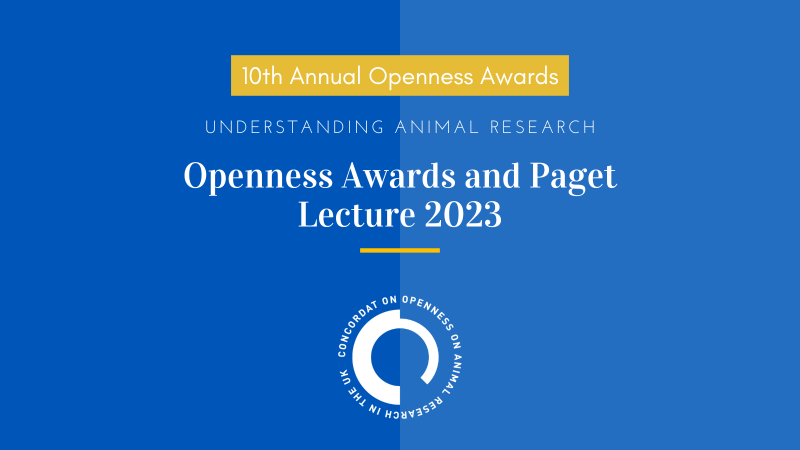
UAR is delighted to announce ten new Leaders in Openness
Since its launch in 2014, the Concordat on Openness on Animal Research in the UK has set out a clear list of commitments for its respective institutions to follow to improve transparency regarding their use of animals in research. Over the past decade, signatories have worked to transform the culture of animal research communications by explaining when, how, and why animals are used, strengthening engagement with the public and media, proactively creating opportunities for dialogue, and reporting progress each year. These efforts have resulted in a wealth of accessible information, innovative public engagement activities, and a growing willingness within organisations to discuss their research openly and honestly.
As we celebrate eleven years of the Concordat on Openness, it is clear that while every signatory is on their own journey towards greater openness, some organisations consistently set the pace for the sector. ‘Leaders in Openness’ status recognises those who dedicate significant resources to embedding best practice throughout their organisation, ensuring that transparency is not just an aspiration but a reality at every level. These organisations go beyond individual projects, developing and implementing robust structures and processes that support openness and drive lasting change. By sharing their experiences and approaches, Leaders in Openness inspire others and help raise standards across the bioscience community.
To achieve Leader in Openness status, organisations must demonstrate sector-leading communication through a rigorous application process, assessed by both public representatives and peer reviewers. This status is held for three years, after which reapplication and evidence of continued leadership are required, ensuring that recognised organisations remain at the forefront of openness. As we announce the 2025–2028 Leaders in Openness, we celebrate those who have made openness a core part of their identity, moving the conversation forward, supporting public understanding, and setting a high bar for transparency in animal research communications.
The 10 new Leaders in Openness for 2025-2028 are:
Congratulations to these ten organisations, who join the following list of Leaders in Openness:
Hannah Hobson, Head of Communications and Engagement at Understanding Animal Research:
“The Concordat on Openness on Animal Research in the UK was established to provide clear guidance for organisations using animals in scientific research, helping them communicate openly about their work and the reasons behind it. Greater openness regarding how and why animals are used enables the public to consider both the potential benefits and the ethical considerations, fostering informed discussion and trust.
“Each year, the Concordat recognises institutions that consistently meet the highest standards for openness and transparency in their animal research communications. These organisations excel in internal communications, public-facing websites, social media, media engagement, and public outreach, setting a benchmark for the sector and leading by example.
“For 2025–2028, a select group of research organisations has once again demonstrated outstanding commitment in all these areas, earning the ‘Leaders in Openness’ title for three years. This recognition reflects the energy, thoughtfulness, and courage they show in making information about animal research accessible and understandable to the public on a subject that is often complex and misunderstood.
“The Concordat’s aim is to move past secrecy, building public trust through a clear and established code of practice for life science research communications. By explaining why animal research is carried out and how harms are minimised, signatories help the public weigh the benefits and costs and address widespread misconceptions about this important area of science.”
Robin Labesse, Head of Facility Management, Agenda Life Sciences:
“We’re ecstatic to have maintained our status as a Leader in Openness. This recognition means a lot to us because openness is something we actively live and breathe as a company. We believe that clear, honest communication builds trust and stronger relationships. A big thank you to all my colleagues and our clients, whose ongoing support and shared commitment to transparency make this possible. We’re proud to stand alongside others championing openness and will keep pushing forward together.”
Dr Louisa Wood, Head of Communications at the Babraham Institute:
“We’re delighted to be recognised as a continuing Leader in Openness since first attaining the status in 2019. Through the dedication of our teams and the efforts of passionate individuals, our approach to openness continues to grow. We’re proud of the initiatives we have implemented over the last three years which demonstrate our lasting commitment to transparently communicating about how and why mice are used in the Institute’s life sciences research.”
Sarah Hart-Johnson, Director of the BRF, The Francis Crick Institute:
"We are thrilled that we have been recognised once more as a Leader in Openness on animal research. We are passionate about our commitment to animal welfare and to communicating the animal research carried out at the Crick, supported by our skilled and caring team of animal research staff. We will continue to be open and transparent about how the study of animal models enables us to explore how living things work and to drive benefits to human health."
Professor Marina Botto, Director of Bioservices, Imperial College London:
“A well-deserved sustained recognition for all the continued efforts to promote openness and awareness of animal research and 3Rs developments. As a world-leading medical research institution, animal research forms a small but vital part of Imperial’s biomedical research as we seek new ways to benefit human health. We continue to promote reducing and replacing our use of animals, where possible, and strive for refining and ensuring the highest standard of care where the use of alternatives is not yet possible. Many people have contributed to this award, and it recognizes the whole team's creativity and efforts. Well done everyone.”
Dr Matt Leach, Director of the Comparative Biology Centre, at Newcastle University:
“As a university, sharing accurate information about our use of animals in research is vital to broadening understanding of this area of work helping human health and improving animal care. It is thanks to the hard work of both our scientific and communication colleagues that we are able to achieve this and retaining our status as a leader in animal research openness recognises their significant contribution.”
Professor Jonathan Elliott, Establishment Licence Holder, The Royal Veterinary College:
“The RVC is delighted to be recognised as a leader in openness for the period 2025-2028. The openness agenda supports the culture of care for the animals we use in our research and for the staff who look after them at our institution. Over the last 10 years, the concordat on openness has helped many institutions who use animals in research to share best practice and has ensured many of us improve, not only how we communicate with our stakeholders but also the care we take when using animals to advance biomedical and veterinary science from the benefit of society.”
Professor Sarah Bailey, Openness Champion, University of Bath:
“We are delighted to retain our Leader in Openness status which we have held continuously since 2019. The award acknowledges the sustained, collective efforts of a dedicated and collaborative team including animal technicians, researchers, AWERB members, our Communications Department and Press Office and the senior management. It’s great to have this recognition of our work towards building a culture of openness and engaging the public with the humane use of animals in biomedical research at Bath. We have continued to push our boundaries and I’m looking forward to what we’ll achieve next. “
Dr Maria Kamper, Biological Services Facility Director at The University of Manchester:
“The University's commitment to the Concordat on Openness in Animal Research drives our transparency in animal studies. With just a few clicks, the public can access details about our research methods, animal species, numbers, and ethical frameworks. We offer virtual tours, participate in science fairs, and host various public events. School groups, journalists, and community members also regularly visit our facilities. This recognition of the efforts of the BSF staff is gratifying, and we enthusiastically pledge to continue advancing this important transparency agenda."
Last edited: 14 May 2025 14:03



